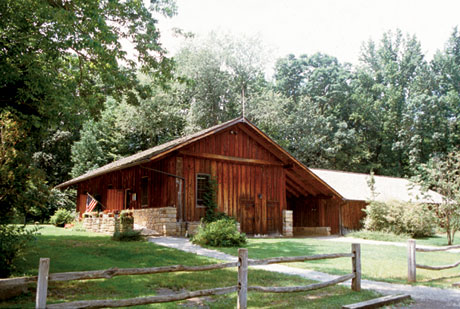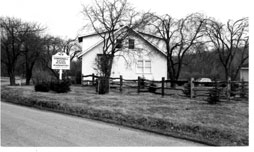Back

PHOTO MINDY MCNAUGHER
 Fifty years ago, General and Mrs. Richard K. Mellon and
Mr. and Mrs. Alan M. Scaife presented Carnegie Museums
of Pittsburgh 1,160 acres of land near Ligonier, Pa., to
use as a natural science field station for its Museum of
Natural History. Dubbed Powdermill Natural Reserve, the
picture-perfect spot was teeming with rich woodlands, streams,
open fields, ponds, thickets, and plenty of wildlife. Fifty years ago, General and Mrs. Richard K. Mellon and
Mr. and Mrs. Alan M. Scaife presented Carnegie Museums
of Pittsburgh 1,160 acres of land near Ligonier, Pa., to
use as a natural science field station for its Museum of
Natural History. Dubbed Powdermill Natural Reserve, the
picture-perfect spot was teeming with rich woodlands, streams,
open fields, ponds, thickets, and plenty of wildlife.
The
creation and preservation of such a place was the dream
of Dr. M. Graham Netting, the former assistant director
of Carnegie Museum of Natural History, who in 1948 outlined
his vision in a written plan that targeted the Ligonier
Valley as the ideal spot for a nature reserve. And in 1956,
through the generous support of the Mellon and Scaife families,
his dream became a reality.
Since that time, Powdermill has more than fulfilled its
original charter. Its staff have recorded great annual
changes in weather conditions and bird and mammal life,
and its expanded 2,200 acres serve as a refuge for countless
plants and animals, many of which are becoming rare in
our region as their habitats are destroyed. What’s
more, studies have found that Powdermill Run, the mountain
spring stream that traverses the property, is one of the
few unpolluted streams left in the region for ongoing studies
of aquatic life.
“
We host a number of visiting researchers each year, many
of whom think this place is a little bit of paradise,” says
David A. Smith, director of Powdermill. “And you
know what? They’re right. In addition to its unspoiled
beauty, Powdermill provides increasingly rare opportunities
for the study of the natural ebb and flow of nature—including
the migration patterns of birds and the general biodiversity
of the living land. It’s a natural scientist’s
paradise, not to mention an incredible resource for all
of us.”
Powdermill is also home to the Florence Lockhart
Nimick Nature Center, constructed in 1983 (and expanded
in 1993)
in memory of the late wife of Thomas H. Nimick Jr., a longtime
friend of Dr. Netting and Powdermill. The Center hosts
children and adults for free nature programs every Sunday
from January through October, as well as weeklong summer
camps for kids and school field trips throughout the year.
And plans are now under way to make it the centerpiece
of “the nature center of the future.”
In December
2005, the Richard King Mellon Foundation awarded a $3-million
grant in support of the Powdermill Sustainable
Facilities Development Project—a giant first step
in Powdermill’s first-ever capital campaign. The
gift from the Foundation includes a challenge component
totaling $1 million: for every dollar raised for the expansion
and renovation project, the Foundation will match it with
$2, for up to an additional $1 million.
“
We’re so pleased to be able to participate in the
expansion and renovation of Powdermill Nature Reserve,” says
Seward Prosser Mellon, president of the Richard King Mellon
Foundation. “The upgraded facility will use environmentally
friendly, sustainable technologies that, in turn, will
attract an increasing number of visitors, particularly
those who wish to see and learn about green design.”
Smith
adds that to complement the expanded facilities, his staff
is planning new educational
programming that focuses on sustainable and green design
for landowners and contractors,
municipal and township personnel, political leaders, and
homeowners.
“
Our goal is to be an even more invaluable resource,” he
says, “to Carnegie Museums, the region, and the scientific
community.”
Fundraising
note: At Powdermill’s ninth annual Garden
Themes & Birdhouse
Dreams Auction, to be held on Friday, May 26, a beautiful,
one-of-a-kind needlepoint rug—created by 18 volunteers
and valued at $15,000 —will be raffled off in support
of Powdermill’s Avian Research Center. Raffle tickets
are $100 and can be purchased online at www.naturalhistorystore.com
or by calling 724.593.6105.
Back
| Top |